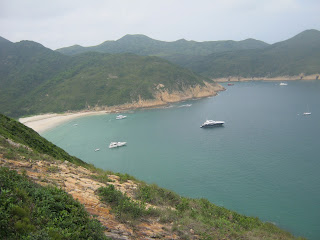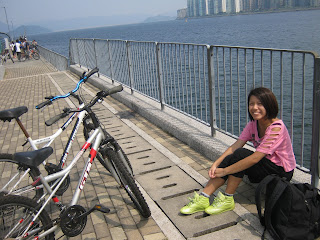Putonghua? Meiyou (Mandarin? None)
From Sapa, we took a bus back to Lao Cai, which sits right on the border opposite China’s Yunnan Province. This part of the trip was our most foreign and challenging, as none of our guidebooks really talked much about entering China from Lao Cai. All we knew was that the Chinese city on the other side was called Hekou and that from there, we could take a bus to Yuanyang, our next destination.
One woman in a hotel in Sapa told us that they sold Chinese bus tickets on the Lao Cai side so we’d be able to plan our trip to Yuanyang before leaving Vietnam. Even though my guidebook confirmed this, we could not find the so-called bus ticket counter anywhere and decided to just cross the border and figure it out from there. (Sidenote: 'We'll figure it out later' was one of the most common phrases on our trip. That along with, 'Would you stop eyeing my Dong?!') The border process consisted of a Vietnamese guy suspiciously stamping our passports as we exited the country, walking a hundred yards in no man’s land, then waiting for a Chinese guy to suspiciously stamp our passports on the Hekou side.
 |
| Luke, somewhere between Vietnam and China |
Once we got to Hekou, it was dark and we had no idea what the hell to do. We walked into a place right next to the border that appeared to be some sort of travel agency with pictures of Halong Bay and Hanoi outside. After a few minutes of trying to awkwardly communicate in hand gestures with the people working there, I spoke to them in my broken Cantonese, and lo and behold, one of the women could understand, despite being quite far from Hong Kong and the Canton area. We managed to find out that this place also had accommodation and we could have a room there for about 5 USD a night. Tired and ready to put our things down, we decided to book this hotel or whatever it was.
Next we began to wander around, approaching people and pointing to the Chinese characters for bus station on my iPad's translator app with a questioning shrug. Everyone seemed to point different directions and no one spoke a word of English. Finally, we showed it to a man who hailed a taxi for us. We got in without thinking about it, being tired and confused.
We were convinced that the bus station was close, as my guidebook said it was only 50 meters from the border. So when the taxi got onto a highway and started taking us far from anywhere with all our stuff back in the hotel, we became a bit anxious, to say the least. Finally after about ten minutes, the taxi driver stopped in what appeared to be the parking lot of another hotel. He then mimed writing the number ‘100’ on his hand with his index finger. I said, ‘No way!’ and wrote ‘50’ on mine. He didn’t relent and eventually, we gave him the equivalent of 16 USD. Then as if reveling in his trickery, the driver held our 100 RMB note up to the light to check if it was counterfeit.
We got out of the asshole’s cab and went inside the nearby hotel, imagining if anyone could speak English in this town it would be at the fancy hotel receptionist. False. But, miraculously she too could speak Cantonese! To put this in perspective, the two ladies at the two different hotels were the only two non-tourist Cantonese speakers I met on the entire trip. I managed to tell her we were looking for the bus station, she told us it was next to her hotel but it was closed and we should come back in the morning. I thanked her and asked her to write down 'border’ in Chinese so we could get back to the other hotel with our stuff. This time, we got in a taxi for 3 USD and the next morning, caught the bus to Yuanyang, where we spent a pleasant two days, walking through some beautiful rice terraces.
So…here are the takeaway moments of that nerve-wracking evening.
-The guidebook made a huge mistake in saying the Hekou bus station was 50 meters from the border. I’m going to email the publisher.
-Knowing a bit of Mandarin would have saved us a lot of hassle.
-On the other hand, speaking a little Cantonese was a big help.
-We didn’t see, let alone interact with, any foreigners or English speakers over a period of nearly 24 hours between Lao Cai and Yuanyang.
-Getting ripped off by that taxi driver was frustrating but hardly a catastrophic event. We survived!
And here are some of the photos from Yuanyang, the much calmer, easier to navigate place we went to next:
 |
| Hiking in Yuanyang |
 |
| Rice terraces |
 |
| More rice terraces |
 |
| The sun sets on Xinjie |
 |
| Ooooh, aaaah |
A Real Life Good Guy Greg
(
see namesake) The last stop of our trip was Kunming, a small Chinese town of four million people. Okay it's a bit more than a town I suppose but I never stop being shocked by the size of Chinese cities. Chicago is the third largest city in the US with approximately 2.7 million people living within the city limits. Do you know how many Chinese cities are larger than Chicago? Answer: 32. True story,
according to Wikipedia, which I trust with my whole heart.
Anyway, after arriving on the bus from Yuanyang to Kunming, we wanted to try to find a hostel that my old friend and until recently, fellow expat Henry had recommended. After searching for a while and finally finding it, they told us IN ENGLISH (!) that there were—sigh—no rooms available. And the same was true at the other hostels, they told us. We found another hotel, but the receptionist looked scared, and kept waving her hands as if to say, ‘Sorry but I don’t know how to communicate with your kind and therefore can’t help you. Sorry again!’
After getting rejected by a handful of taxis, we decided to try to walk towards another one of the hotels mentioned in the not-so-trusty guidebook. Enter Greg Liu. Just as we had stopped to look over the basic map of Kunming, a slightly pudgy Chinese man of 35-40 comes up to us and asks, in English, ‘Can I help you?’ We were taken aback and said, ‘Yes, we’re looking for a place to stay around here. Any recommendations?’ He pointed us in the direction of the city center but then said he was going there anyway and we could join him.
We walked for a while and had some small talk. He was jeweler who had majored in English in university and we told him about ourselves, two American classmates who had been living in the far away locations of Hong Kong and Sydney. He took us to another hostel, which was expectedly full and then a nearby hotel that said, even after showing us a room, that they legally couldn’t take foreigners. Never quite figured out why they even offered to show us a room. Perhaps they thought there was a chance that we may have Chinese citizenship somehow?
Next Greg told us he would try to drive us to a hotel. We got in his car, and he began to complain about Kunming traffic and the government. He told us we were lucky and that America is much more free than China. He also began telling us about his car, which was French and quite fancy, though I can’t remember the make. Finally, we found a hotel that would take us. In the lobby, he informed us, ‘This hotel doesn’t take Japanese because we REALLY hate the Japanese. But Americans, you’re okay.’ I asked if his the anti-Japanese feelings had to do with the Diaoyu Islands dispute and he said, ‘Yes and do you know about what happened in Nanjing? Very bad.’
Despite this xenophobia, we couldn’t believe what an act of kindness Greg had performed for us. He helped us, two complete strangers from America, for a full hour and a half. And in the end, he succeeded in securing a great hotel for a reasonable price. We were sure to get his email to thank him for how he’d helped us. Living in Hong Kong, it’s easy to be leery of the mainland Chinese, but I have no doubt that for every obnoxious tourist, pushing their way through a Hong Kong train station, there’s a
good guy like Greg Liu, helping out some lost travelers on the streets of Kunming.

 |
| Temple in Kunming |
 |
| Yunnan Provincial Museum |
 |
| Cui Hu Park |
 |
| Downtown Kunming |







































































